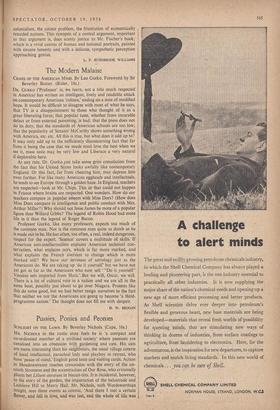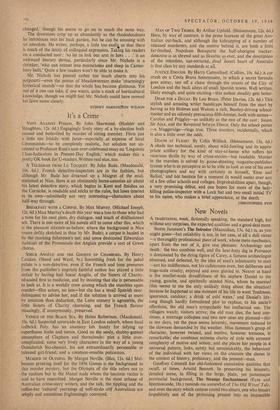Pussies, Ponies and Peonies
SUNLIGHT ON THE LAWN. By Beverley Nichols. (Cape, 16s.) Ma. NICHOLS in the rustic state feels he is 'a compact and co-ordinated member of a civilised society' where passions are canalised into an obsession with gardening and cats. His cats are more interesting 'than his neighbours, the usual village coterie of local intellectual, parochial lady and playboy in retreat, who have 'peace of mind,' English good taste and visiting cards. Action in Meadowstream reaches crescendos with the entry of the un- couth Stromens and the eccentricities of Our Rose, who criminally plants her Lilium aural= in biscuit-tins. It is incidental, however, to the story of the garden, the importation of the balustrade and Ladslove Hill to Merry Hall. Mr. Nichols, with Wordsworthian Insight, sees these events as cosmic, 'And there I met a certain flower, and fell in love, and was lost, and the whole of life was
changed,' though his seems to go on in much the same way.
The diversions crop up as abundantly as the rhododendrons he introduces into his back garden, but he can be amusing with an anecdote. He writes, perhaps, a little too easil4 so that there is much of the laxity of colloquial expression. Taking his readers on a conducted tour: 'so let us link our arm in hers . . .' is an awkward literary device, particularly since Mr. Nichols is a shrinker, 'who can retreat into mouseholes and sleep in Canter- bury bells.' Quite a few readers won't be able to make it.
Mr. Nichols has poured rather too much charm into his potpourri—even the ponies of Meadowstream make 'charmingly hysterical sounds'---so that the whole has become glutinous. Yet out of it one can take, if one wants, quite a stock of horticultural knowledge, though we might feel Mr. Nichols could have mowed his lawn more closely.
SYDNEY HARRING*ON WILSON



































 Previous page
Previous page